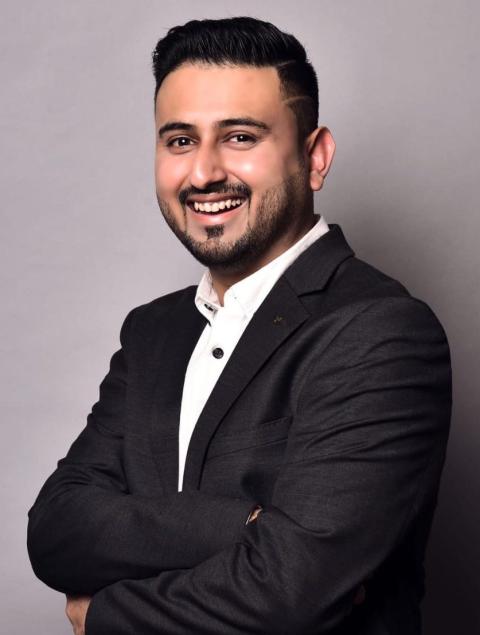Berklee Valencia Graduate Abhinav Agrawal Named to Forbes 30 Under 30 Asia List

He’s the executive director and founder of the Anahad Foundation, an NGO that functions as a record label, producing and releasing songs by Indian folk artists and directing all royalties back to the musicians.
“I work in two fields where people say there is hardly any money yet many challenges: music business and social entrepreneurship,” says Agrawal, 26, who adds that he hopes that the recognition from Forbes will help him gain credibility despite his young age. His foundation has served more than 800 Indian artists since 2013. “Seventy percent of the Indian music industry comprises of folk music, but less than 2 percent of total revenues go to this 70 percent,” he says.
Agrawal says his experience in Berklee’s Master of Arts in Global Entertainment and Music Business program gave him the knowledge and tools needed to succeed in his career: “Before I came to Berklee Valencia, I had a vision: I wanted to help musicians but I didn't know how. When I started working with my classmates and fellow colleagues from the other graduate programs, I realized the power of recording music, and also copyrights and royalties.”
From Problem to Solution
Prior to founding Anahad, Agrawal had volunteered at a number of other Indian organizations that provide artists with performance opportunities and management services. The problem with these organizations, he says, is that artists would become overly dependent on them. “Somewhere in my mind I had this idea to design something that would make their activities more self-sustainable,” he explains.
In Valencia, he realized how he could achieve this. First, he needed to figure out how to help more Indian folk artists, many of whom cannot read or write, copyright their work. He recruited his girlfriend, Shuchi Roy, a lawyer with the Supreme Court of India, to run workshops teaching artists how to design simple contracts to protect their music. Roy now serves as Anahad’s director.
Second, he had to find a way to provide recording and marketing services at no cost to the musicians. With the help of students in the Master of Music in Music Production, Technology, and Innovation program, he designed a basic backpack studio consisting of nothing more than a laptop with a sound card and microphones. The first Indian artist he recorded was Dapu Khan, a Rajasthani musician he found on YouTube. “It took three months to convince Dapu, but after we recorded him in his village, his life changed. He got three shows, performing at two marriages and in Germany. The video went viral, and the next time we went to Jaisalmer there was a queue of musicians outside our hotel asking us to please record them,” he says.
Anahad seeks folk musicians from five Indian states, but how they go about finding artists varies from region to region. “In Karnataka, for example, folk music is only allowed to be performed in temples, so we contacted the highest priests so they could recommend artists to us,” he says. Agrawal says they consider five factors when choosing which artists to work with: if the artist is living below the poverty level, the rarity of the instrument they play, the danger that the instrument will become extinct, the uniqueness of their tribe, and the authenticity of the artform.
Building a Dream Team
Agrawal’s portable studio, as it was initially designed, had several problems. It had to be lighter so that it was easier to travel with, and it required a power source, which many people living in rural areas in India do not have access to. It also needed an updated wireless system, protection against harsh weather conditions, and better microphones. Help came from an unexpected source: Gael Hedding B.M. ’05, a Latin Grammy Award–winning engineer and a former production manager at Berklee’s Valencia campus.
“[Hedding] was following me on Instagram and sent me a message saying that he really liked what I was doing, and that he could help us,” says Agrawal. “So he spent three months with us and designed a real portable studio from scratch and trained us in how to use it. Funnily enough, I never met him in person while I was in Spain.”
Agrawal says Berklee Valencia provided him with networking opportunities that allowed him to create his dream team, a group that includes Berklee Valencia faculty members Tony Woodcock and Alexandre Perrin, who serve on Anahad’s Board of Trustees, as well as Alex Canuto M.A. ’16.
“[Agrawal] kick-started his project by drafting the business plan and raised a large amount of money by designing his own crowdfunding platform,” says Perrin. “What used to be a pure intellectual construction has become a reality, a true driver for social change. It is such a pleasure for an academic like me to see that. I am so proud of him and his team."
The next step for Anahad, Agrawal says, is training local musicians on how to use the portable studio (which he now calls the “briefcase studio”), so they can record even more folk artists in every corner of the country. Agrawal is also presenting on Anahad at Forbes conferences in Hong Kong and Detroit.
